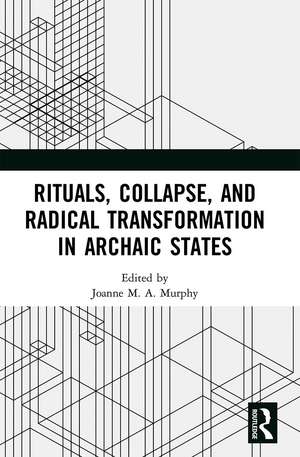Rituals, Collapse, and Radical Transformation in Archaic States
Editat de Joanne M.A. Murphyen Limba Engleză Paperback – 29 apr 2022
Chapters examine ritual in collapsing and regenerating archaic states from diverse locations, time periods, and societies including Crete, Mycenean and Byzantine Greece, Mesopotamia, India, Africa, Mexico, and Peru. Underscoring similarities in a variety of archaic states in the role of ritual during periods of threat, collapse, and transformation, the volume shows how ritual can be used as a stabilizing or divisive force or a connecting medium between the present to the past in an empowering way. It also highlights the diversity of ritual roles and location in similar situations and illustrates how states in close proximity and sharing many cultural similarities can respond differently through ritual to stress and contrast the different response in rural and urban settings.
Through detailed, cultural specific studies, the book provides a nuanced understanding of the diverse roles of ritual in the decline, collapse, and regeneration of societies and will be important for all archaeologists involved in the important notions of state "collapse" and "regeneration".
| Toate formatele și edițiile | Preț | Express |
|---|---|---|
| Paperback (1) | 387.61 lei 6-8 săpt. | |
| Taylor & Francis – 29 apr 2022 | 387.61 lei 6-8 săpt. | |
| Hardback (1) | 764.20 lei 6-8 săpt. | |
| Taylor & Francis – 30 sep 2020 | 764.20 lei 6-8 săpt. |
Preț: 387.61 lei
Nou
Puncte Express: 581
Preț estimativ în valută:
74.20€ • 76.31$ • 61.56£
74.20€ • 76.31$ • 61.56£
Carte tipărită la comandă
Livrare economică 19 februarie-05 martie
Preluare comenzi: 021 569.72.76
Specificații
ISBN-13: 9780367542986
ISBN-10: 0367542986
Pagini: 242
Ilustrații: 112
Dimensiuni: 156 x 234 x 13 mm
Greutate: 0.56 kg
Ediția:1
Editura: Taylor & Francis
Colecția Routledge
Locul publicării:Oxford, United Kingdom
ISBN-10: 0367542986
Pagini: 242
Ilustrații: 112
Dimensiuni: 156 x 234 x 13 mm
Greutate: 0.56 kg
Ediția:1
Editura: Taylor & Francis
Colecția Routledge
Locul publicării:Oxford, United Kingdom
Cuprins
1. Ritual during periods of decline, collapse and transformation in ancient states; 2. Old deities for new men: religious practices and societal transformation during the Late Bronze Age/ Early Iron Age transitional period on Crete; 3. Rituals and tombs during the radical transformation of the Pylian State; 4. The legacy of Byzantine Christianity in the southern Mani Peninsula, Greece, after imperial collapse; 5. As Wari weakened: ritual transitions in the Terminal Middle Horizon of Moquegua, Peru; 6. Ritual resilience and adaptation in the wake of political transformation at Dainzú, Oaxaca, Mexico; 7. Rejecting, reinventing, resituating: a diachronic perspective on ritual in the aftermath of Tiwanaku state collapse; 8. Contextualizing the ritual phase in the evolution of eastern and southern African chiefdoms and states; 9. Flux and continuity in monument-building traditions in south India; 10. Merit-making at ancient Bagan, Myanmar: the role of socio-spiritual and political-cultural entanglements in the rise and fall of a classical Southeast Asian state; 11. Scales and pathways of human politico-economic affiliation: the roles of ritual
Notă biografică
Joanne M. A. Murphy is an associate professor of Classical Studies at the University of North Carolina Greensboro. Her work focuses on the archaeology of ritual and death in Bronze Age Greece and has addressed these issues in both the early small-scale communities of Crete and the later states on the mainland.
Recenzii
"This book is a must-read for students of collapse. In viewing collapse through the important social, institutional, and political lens of ritual, it reveals a fruitful avenue for further research and for describing and explaining aspects of collapse. It is a lens that allows us to focus on various levels and parts of a society in collapse." – Guy D. Middleton, AJA
Descriere
Rituals, Collapse, and Radical Transformation in Archaic States explores role of ritual in variety of archaic states and generates discussion on how decline in a state’s ability to continue in its current form affected practices of ritual.
